Sack Of Snacks Condemned For Cacophony
Sack Of Snacks Condemned For Cacophony
“The thing is, you feel guilty about complaining since they are doing a good thing for the environment. But you want to snack quietly and you don’t want everyone in the house to know you are eating chips.”
-Computing consultant Kathy Frederick discusses one of the greatest challenges facing our nation today: the new compostable bags for Frito-Lay Sun Chips crinkle really loudly.
Must Focus On Importance Of Research, Must Focus On Importance Of Research
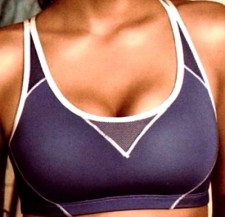
Talk to me about “jiggle,” Science: “Researchers from the University of Portsmouth in England and other schools recently attached reflective markers to the breasts of a group of female runners and had the women jog along a track while wearing various types of bras or forgoing breast support. The researchers charted the trajectories of the women’s breasts, using infrared cameras.” But to what end?
What the researchers found was that breast sway did, in fact, have a significant effect on the women’s running. When the runners were braless, their strides changed; they landed more heavily, with more of the impact force moving through the inside of their feet. This alteration in stride seemed to be related to “significantly higher amounts of breast movement in that direction,” said Jenny White, a doctoral candidate at the University of Portsmouth and the study’s lead author. As the breasts swung from side to side, so, in effect, the researchers hypothesized, did the women’s body weights. The implications of this finding are disquieting. “Higher forces exerted by the foot when running indicate a higher intensity of stress for a runner,” Ms. White said, “which has potential to increase physiological demand.” The extra forces also, over time, can “lead to the development of stress-related injuries.”
This is actually very important research. If we can find a way to allow women to remain fit while reducing the risk of injury we can quite literally improve both mental and physical well-being throughout our society. I’m very serious when I say that, particularly given rising obesity rates and our more sedentary lifestyles, it’s extremely vital that we focus on solutions that will help people stay in shape and increase positive health outcomes. Which is why I am so ashamed that all I can think when I read this story is, “Holy hell, how can I get a job where I get to stick mirrored tassels on pendulous breasts and then sit back and watch them bounce around a track all afternoon?” It is disrespectful, juvenile and sexist, and I am very sorry. But, you know, COME ON.
$10 Billion in Schools Stimulus To Create... Zero Jobs
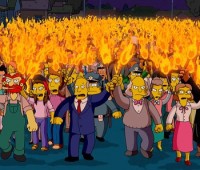
Just like financial service companies, manufacturers, law firms, media companies and nearly every other industry in these here United States, even our fine public schools refuse to create jobs in the recession, despite the $10 billion in stimulus money. Hey, at least we’re getting a smaller government: “State and local governments have let go 102,000 more employees than they have added in the last three months.”
The recovery! It’s just five million new jobs away!
The Lessons of the Blagojevich Trial
“I might be a lobbyist after this. I’ve seen all the money they make.’’
-College student Erik Sarnello, a member of the jury which convicted former Illinois governor Rod Blagojevich on only one of the 24 charges brought against him, revises his career plans in the wake of the corruption trial.
The Slap That England Deserves
by Daniel D’Addario
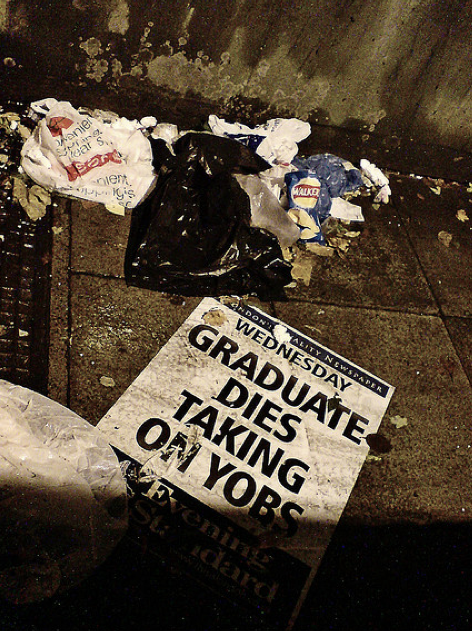
I had hoped to soak up as much contemporary British culture as I could while spending the summer working in England. It helped that I’d spent the lead-up to my summer reading Booker-ratified authors like Peter Carey (Australian, yes) and Ian McEwan-I wanted to be ready for the Anglophilic culture that produced such minds.
My trip got off to a disillusioning start, though, and not when I realized that the nation’s top pop star sounds like Dick van Dyke in Mary Poppins. While the students I was chaperoning had gone to an arcade, I sat at a picnic table with coworkers when a band-not a group, certainly a band-staggered up. All were clearly drunk. It was about seven p.m.
“Where the fook are y’ from?” the talkative member of the group asked me, putting his leather-jacketed arm around me.
“New York,” I said. I didn’t presume he would know Connecticut.
“Fookin’ Central Perk! Who’s your favorite Friend?”
I wasn’t sure of the right answer. Say Matthew Perry and be condemned as a ponce; Lisa Kudrow makes the respondent a bit too freaky; Jennifer Aniston seemed the go-to, but also, obviously, unthinkable. “I don’t really watch Friends,” I said.
“More of a Will & Grace man, are ye!” he shouted, patting my shoulder quite a bit too hard to make sure I knew what he meant. His friends formed a tight, snickering circle. There they stood, saying little that had not already been said but saying it again and again, until the waitress threatened to call the police, and they went to the next table to flirt with some thirtyish women.
* * *
Those men, the leathery chap with his friends and his Friends DVDs, have been on my mind since the Booker longlist was released late last month. Which seems weird: the dominant narratives in this year’s race, covered assiduously as ever by the British press, were the “surprise” exclusions (Amis, McEwan, Rushdie) and the possibilities for Lakers-like Booker perennial Peter Carey and the just-the-right-side-of-mainstream favorite David Mitchell.
But a pub crawl on paper has made an impact on the longlist too. It is the top seller of the group and the talk of the press and readers, a sign of its endurance beyond the prize season as well as its formidability in it.
When I bought Christos Tsiolkas’s The Slap, the Waterstone’s clerk popped his eyes out, giving a testimonial, beginning with a low groan, that felt rehearsed. “You’ll love it. You’ll just love it. Ooh! It’s just…” He paused. “Ripping.” The novel is that. It is, from its opening pages, the sort of quick-paced, juicy read that rarely gets nominated for prizes. Both the Guardian and the Telegraph took note of The Slap’s exalted status among book clubs in their initial reporting on the longlist.
The Slap is a bodice-ripper, the sort of novel a college professor of mine would mistakenly/correctly call a “plotboiler.” The inciting incident to the novel’s action is a slap delivered to a misbehaving child by another adult at a barbecue in Melbourne. Tsiolkas declared in a tense, defensive interview with the Guardian after the longlist dropped that the incident came from life: “Tsiolkas’s mother, who emigrated from rural Greece in the 1960s, cuffed, lightly, a three-year-old who was getting under her feet.”
No one cared, Tsiolkas says, in real life, but then, in real life, the child wasn’t the manic spawn of an alcoholic and a flower child and the “cuffer” wasn’t a wife-beating nouveau riche prick.
Or, if they were, the bystander didn’t have Tsiolkas whispering in his ear. The verve of The Slap comes from the author’s heavy hand pushing the reader through the repercussions of the title event-and the tangential sub-events largely pertaining to characters’ love of speed, drink, and sex-through multiple narrators’ consciousnesses.
What worlds, then, is the reader privy to? In the novel’s first paragraph, Hector, the barbecue’s host, farts in bed, “the clammy methane stink” swamping his bedroom, before accidentally saying aloud “sweet young cunt.” In a chapter devoted to the teenage owner of that saccharine organ, sub-YA narration abounds:
Jenna’s tone was bitchy. The two girls looked at each other: Jenna’s speckled green eyes were cool and hard but Connie smiled. Her friend was jealous.
Hector’s wife finds out about his affair:
The bastard had no idea how that made her feel. She looked down at her long-limbed body. She could tell herself that she was attractive, but it would not matter. She did not believe it. Her skin was still smooth, the cellulite hardly visible, her tits had not yet started to sag.
Perhaps the greatest surprise in the Guardian interview was Tsiolkas’s announcement that he is gay, when he writes about a gay character so unconvincingly and women’s bodies so compulsively.
The slaps in the book are grinding and frequent, as Tsiolkas himself acknowledges when he states “the book’s biggest slap” is a fundamentalist Muslim telling the slapped child’s mother that she is a bad person. (She is as weak-willed as an Ayn Rand villain and has already fantasized, out of the blue, about fellating him: “What if I got on my knees for you? She suddenly thought. What if I sucked your cock?”) The book is less one slap than a fraternity rush, where a bunch of brothers paddle you over and over and tell you it’s for your own good. Tsiolkas’s Melbourne is a stand-in for an apparently too-multicultural and therefore dangerously unpredictable world. And it’s a satisfying world for which reader?
This is vicarious reading-these characters hold a lurid not-me appeal for one type of reader (the purportedly anti-American Vernon God Little was the previous standard-bearer for such Booker controversy). Another type that feels that vulgarity is equal to honesty, the end result of the Friends fan telling me repeatedly, each time more angrily, that he was just taking the piss. It was just the way Brits had fun.
Booker winners in the past have had inane and cruel protagonists (The Line of Beauty and Amsterdam), and there would hardly be a British literature if there were not human venality. But with The Slap, the culture of Britain, having exhausted its ability to describe itself and turned south, finds a staging-ground for nasty thoughts about children, Muslims, women, drinkers, Greeks, and so on. Other characters hate them more than you ever could-and it’s okay that they do, because the children, Muslims and the rest are, individually, bad and cruel and ugly people.
Beyond any question of style is the fact of this book’s sheer nastiness. The Slap’s not anti-anything-it’s anti-everything, the work of the moment for a nation that I met more at the pubs and picnic tables of England than in any other book I’ve read. It’s the book of the great muttering resistance of England, a dark-witted, vote-nay group who could rival the American Tea Party for influence if they could only agree on a bar at which to meet.
Elsewhere on the Booker longlist is the literary fiber. The Slap is for a reader who wants a “ripping” read-and I, having left Parrot and Olivier in America in America and saved The Thousand Autumns of Jacob de Zoet for autumn, am hardly superior. The Slap is humanistic only in comparison to an American sitcom; it’s escapism into a world where every person’s mind can be read. Spoiler alert: they’re all thugs.
Daniel D’Addario is back now.
Photo of London by Fabio Venni, from Flickr.
Scotland Wastes Whiskey On Cars
Have the Scots developed a brand new fuel on which we can run our automobiles that is made from the byproducts of whiskey distillation? Quite possibly. This may change the balance of world power as we know it! Pretty soon we’re all going to be speaking with thick, drunken burrs.
Video Report From Poorly-Marketed Natural Disaster In Pakistan
“Humanitarian organizations cited sparse media coverage globally and the relatively low death toll as the main factors in the slow pace of donations. Other elements, they said, included the preoccupation many nations have right now with their own economic problems, donor fatigue left over from the Haiti earthquake; and the August vacation season, when people are somewhat detached from the world.”
–Come on, Pakistan. Everyone knows if you want to roll-out a natural disaster that that puts one-fifth of your country (60,000 square miles, an area roughly the size of England) under water, you don’t do it in August! Also, if you want to get those donations flowing, you really gotta up the body count. Twenty million people merely “left homeless” is not going to put the money into the baskets.
The Death of Charisma Man
by Paige Ferrari
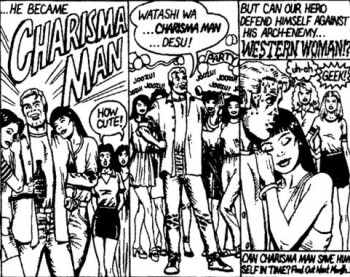
Dear Paige,
I’m thinking of expanding my horizons by going to teach English in Japan. But first, I want to know if it’s true. Can an average-looking American white guy clean up over there? With the Japanese ladies, I mean.
Dear Reader,
I’m glad I made up this question, because I’ve been wanting to talk about the demise of a cultural icon: the inexplicably popular white dude in Japan, a.k.a. the “Charisma Man.”
Perhaps you’ve heard some version of his story: schlubby white guy-not always American, but almost always white in the retelling-goes to Japan, and poof. Women swoon. Bakersfield’s Screech becomes Tokyo’s Zach Morris.
The name “Charisma Man” comes from a late 1990s comic strip exploring this phenomenon. The comic follows the adventures of a (white) Canadian dork who becomes an Adonis in Tokyo. Charisma Man’s mission is to bravely woo beautiful Japanese women while dodging the barbs of his arch-nemeses-busty western chicks who crack wise and call him a nerd on their Tumblrs.*
A new “Charisma Man” book came out last month, but instead of celebrating the CM’s continuing conquests, everyone seemed to be asking whatever the hell happened to that guy? Recently, the Japan Times website invited readers to share their thoughts on Charisma Man. Some submissions were essentially self-eulogies. (One example: “I remember how the Western women would openly lament how dire the dating scene was in Japan and give us guys the evil eye whenever we were spotted with our Japanese ‘fan club’ out for drinks.” )
The truth is, no one is so impressed with foreigners here anymore. And within this subgroup of would-be Charisma Men from the west, the popularity of Americans-beta male or otherwise-is pretty low. (The JET program-which for 23 years has subsidized a year-long sushi party for a hoard of young, mostly Americans-is on the chopping block.) The Japanese government’s increasingly tenuous relationship with the U.S. is echoed in the skepticism of my Japanese girlfriends who, when I introduce them to a guy from the States, have been known to lean in and whisper, “Is he really cool? Or just cool here?”
To talk to veteran Charisma Men in Japan-and there are many, holed up in westerner bars, whereas 15 years ago they would have been peacocking around Roppongi Crossing-is to get a sense that you missed a critically important era. They will tell you about a time when otherness could still be leveraged into a few hours at the love hotel, and when the booming English conversation school business meant that almost any native speaker with the money for plane fare could become a sensei. With a fan club.
From a cynical perspective, this is the expat equivalent of Southern good ol’ boys bullshitting about a time when being a white American male really meant something. More charitably, Charisma Men are just dreamers, pining for a beautiful bygone era when all the pretty girls plain loved America.
Retired Charisma Men always talk about moving somewhere else-maybe China, or Thailand, but rarely back home. There must be somewhere left in the world where even an asymmetrical dude from the states can be embraced without scorn or skepticism, right?
*”Charisma Man” touches on the idea that, while white men and women repress their mutual loathing in countries where they are the majority, in Japan the reality of their deep, long-standing hostility is on full display. White women think white men are losers capitalizing on their exotic status to get laid. White men think white women are fat, bitter, and abrasive. Both parties make excellent points.
Paige Ferrari lives in Tokyo.
"Douthat is Full of Crap in Several Ways," Notes Academic Historian
“Douthat is full of crap in several ways.”
–Christina Ziegler-McPherson, author of Americanization in the States: Immigrant Social Welfare Policy, Citizenship, and National Identity in the United States, 1908–1929
.
Big British Carp, Somewhere Between 1965 and 1970-2010
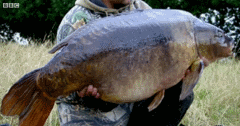
A year after the passing of legendary British carp Benson, there is once again piscine tragedy on Knifecrime Island: Two Tone, a 67-pound mirror carp, “has been found dead in the lake where it lived in Kent.” Described as “a bit of a loner,” Two Tone was believed to between 40 and 45 years old. August is indeed the cruelest month for giant fish in England.
